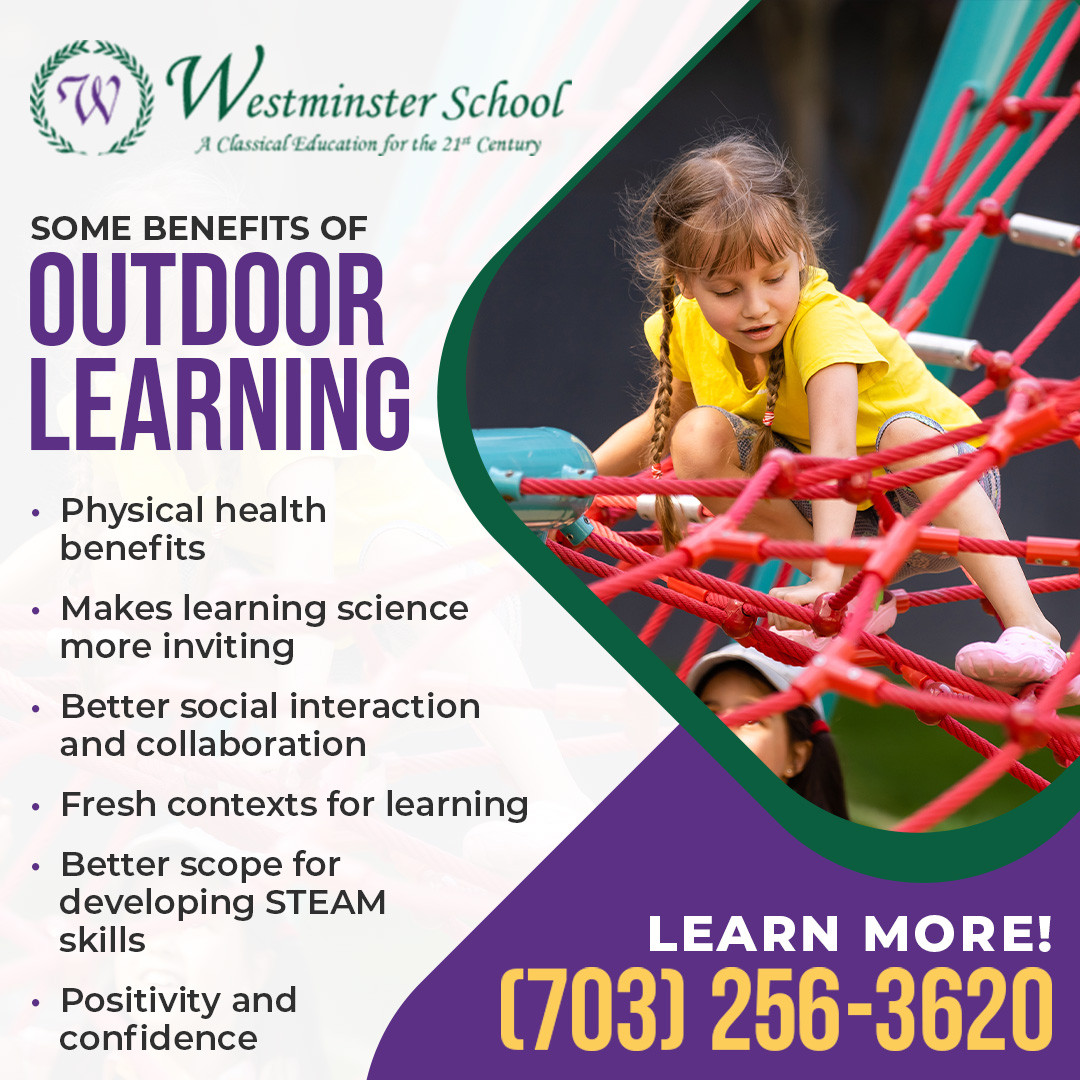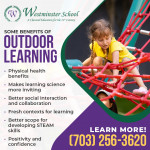With current living conditions, family structures, and lifestyles, there are fewer opportunities for children to be outdoors than in previous generations. In our digital age, the number of electronic media and entertainment outlets reduces the time spent outdoors by children. Many parents recognize this, but their busy work and household schedules make prioritizing outdoor play difficult. A situation like this is where schools can make a difference. Those like Westminster School in Annandale, Virginia, take this a step further by providing outdoor learning to their students. In this article, Westminster School lists some advantages of outdoor learning.

Schools with access to playgrounds, playing fields, and outdoor space can utilize these resources to enhance student learning and experience. Westminster School is situated on a seven-acre campus, giving its students a beautiful environment to learn, play, and grow. The school has outdoor time for young learners during daily recess and PE, as well as other scheduled activities.
Some benefits of outdoor learning include the following:
1. Offers Physical Health Benefits
Outdoor learning increases physical activity and improves the general fitness of children. For younger children, more exercise helps to boost motor skill development. Exposure to fresh air and sunlight helps their bones and muscles develop and grow. Children with exposure to the outdoors are stronger, have better balance, and are better coordinated. This makes them more likely to remain physically active and more appreciative of the outdoors.
2. Makes Learning Science More Inviting
When children learn science outdoors, the process is more natural and engaging; the understanding more clear, and the recollection of material is longer-lasting. Take, for instance, the nature hike the kindergarten students at Westminster School had in September. The students honed their observation powers and busied themselves with searching for items on the list, such as an acorn and a ladybug.
In October, the kindergarteners had a science field trip to Green Meadows Farm to reinforce what children learned in class about farm animals and farming. This real-life learning experience provided a fun day that included a picnic lunch, interaction with the farm animals, and a hayride.
3. Fosters Better Social Interactions and Collaboration
In the outdoors, children explore and discover exciting things that foster conversation among themselves. Upon returning to school, the children can use what they’ve learned to work together on a collaborative project, such as a painting or collage. This project-based approach helps children learn to work together, while also appreciating nature.
Learning and playing in the outdoors allow interactions that help children practice crucial social skills such as how to share, communicate, take turns, solve problems, and make decisions. They develop important life skills such as resilience, confidence, and independence in ways that are different from what happens in a traditional classroom setting. Given the change in seating and atmosphere, a simple picnic outside can give children a welcome break from routine. On occasion, kindergartners at Westminster School have a picnic lunch. They enjoy the experience of eating out, observing the bugs that arrive to sample the food, and engaging in conversation.
4. Provides Fresh Contexts for Learning
Some things are better learned outdoors. Watching ants can help students understand these insects and how they have assigned tasks they perform for their community. Children can learn the basic ideas of balance, weight, and structure from playing in the sandbox or from making creations using leaves, twigs, and pebbles. The Westminster School second-graders had a geography lesson outside on the features of the US Southeast. The fall weather was the perfect backdrop for them to learn about the area’s physical and cultural geography.
5. Offers a Better Scope for Developing STEAM Skills
Outdoor learning and activities provide the perfect setting for projects that develop STEAM (science, technology, engineering, arts, and mathematics) skills. Learning activities can be through simple things, such as playing with water or sand, stacking pebbles, building simple structures, or exploring nature. This needs fleshing out
Research shows that outdoor science and environmental education activities help in building basic science skills like observation, classification, communication, and inference.
The beautiful outdoor classroom at Westminster School was used to reinforce some math concepts for the sixth graders. Miss Uhrmacher’s Math Enrichment class had the children working together to solve an integer escape room in the outdoor classroom. Under guidance, the students created a notes organizer including the rules for addition, subtraction, multiplication, and division of positive and negative numbers. Such classes are a great way of ensuring the concepts are reinforced with practical applications and enabling collaborative work. This is very effective, as evidenced by the spooky Halloween-themed puzzles the children solved using the knowledge they gained in this outdoor lesson.
6. Develops Positivity and Confidence
When children venture out and explore their surroundings, they gain confidence in learning new things. Being able to explore satisfies children’s curiosity and builds self-esteem. Outdoor time calms negative feelings, such as sadness and anxiety, and reduces stress. Outdoor learning is fun, and the change helps break the monotony and keeps children interested in learning.

Westminster School is a private school in Annandale, Virginia, dedicated to providing a superior elementary and middle school education. Their program aims to help each child achieve academic excellence through exposure to the arts and develop a well-rounded character rooted in human values. The staff ensures a diverse, challenging curriculum is taught to children. In order to meet the school's high achievement standards, all efforts are taken to develop good study habits and to foster student responsibility. Parents are actively involved and are offered support so the children complete the program successfully. Parents looking for private education in Virginia can contact Westminster School at (703) 256-3620 or by email at admissions@westminsterschool.com.
































